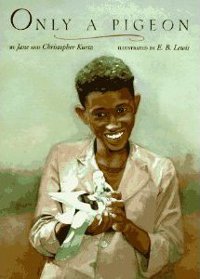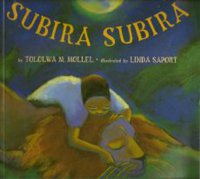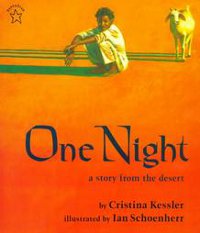Adventure
![]() Adventures take us away in an exotic world. In the African bush, savannas, rain forests and cities we meet heroes who survive by braveness, patience, understanding and compassion. Some stories are pure fiction but some are true.
Adventures take us away in an exotic world. In the African bush, savannas, rain forests and cities we meet heroes who survive by braveness, patience, understanding and compassion. Some stories are pure fiction but some are true.
Only a Pigeon
 by Jane Kurtz, Christopher Kurtz. Illustrator: E.B. Lewis. Simon and Schuster 1997.
by Jane Kurtz, Christopher Kurtz. Illustrator: E.B. Lewis. Simon and Schuster 1997.
Jane Kurtz has lived in Ethiopia for a long time. And many of her stories are set in Ethiopa, like the story about Ondu-ahlem. Ondu-ahlem is a poor boy who lives in the city of Addis Ababa. He shares a mat and blanket with his two younger brothers, walks three miles to his crowded school, and contributes to the family's income by shining shoes in the afternoon. All his free time he devotes to homing pigeons that are precious to him. The birds are all that he owns in the world. He tenderly nurtures the orphan birds, raises and trains them, tends his pigeon coop with infinite care, guarding against hungry predators. He holds the eggs that are almost ready to hatch and shares his delight with his little brother. He enjoys to compete with his friends as they race their favorite pigeons home. The excitement rises when his favorite pigeon is released in a race and makes it home. An author's note discusses the training of the pigons. Ages 4-9. E.B. Lewis is well known for his colourful illustrations. His light-filled watercolors accurately portray the city of Addis Ababa, from morning sunshine to evening darkness, and to the breaking of the next day.
Subira, Subira
by Tololwa M: Mollel, Illustrator Linda Saport (New York: Clarion/ Houghton Mifflin, 2000). Tololwa Mollel grew up in Arusha, Tanzania at the times when oral tradition was still alive and well. Although his interest for children's literature began when he was still young, it was not until he went to study in Canada that he realized the depth of experience related in the stories his grandfather told him.
Tololwa Mollel grew up in Arusha, Tanzania at the times when oral tradition was still alive and well. Although his interest for children's literature began when he was still young, it was not until he went to study in Canada that he realized the depth of experience related in the stories his grandfather told him.
Tatu and her brother have recently lost their mother. Tatu's little brother Maulidi begins acting out, throwing stones, biting and refusing to behave, the girl is at a loss. She has no idea what to do and who can help. Tatu seeks advice from the spirit woman MaMzuka. MaMzuka promises that if Tatu can fetch three whiskers from a lion, she will have the power to change her brother's ways. Tatu soothes the lion with her beautiful singing voice and accomplishes the dangerous task. She also comes to understand that her singing--along with the same patience and courage she showed the lion--will be just the remedy Maulidi needs. Through this ordeal, Tatu learns an important life lesson. Borne on the notes of their mother's lullabies, Tatu's brother is seduced by music. Patience and love save him from his terrible state.
Linda Saport's pastels skillfully blend elements of mystery and everyday life in depictions of a spooky nighttime forest and glowing-eyed lion or of village children walking to school.
One Night. A Story from the Desert
by Cristina Kessler. Illustrated by Ian Schoenherr. Philomel Books 1995.

Christina Kessler comes from California, USA. She has travelled most of her life and visited more than hundred different countries. Especially she likes to go to Africa. She has written many books about her view of this wonderful continent. She has lived for more than two years in Niger, where the Tuareg are travelling the vast Saharan sands. There she has met Muhamad of whom her story is about.
South Saharan Desert: a place where the mornings are good and the nights full of tam tam. Muhamad, a young Tuareg, leads a herd of goats to graze each morning before dawn. He marks his position by noting the acacia trees and termite hills. One evening he sees a goat laboring to deliver her first kid, and he knows he must stay with her, alone in the darkening desert, "for I must deliver safely all goats to my father." While he waits with his charge, he reminds himself of the wisdom of his elders, his grandmother's proverbs and thoughts; his father teaching him the ways of manhood, taking pride in his intelligence and courage. Quietly he realizes that his demonstration of duty is proof of his manhood. He has earned the turban, the symbol of his manhood. He acknowledges the sunset like every morning, bowing to the east and thanking Allah for another day.
You can find many of these books in your childrens' library.

